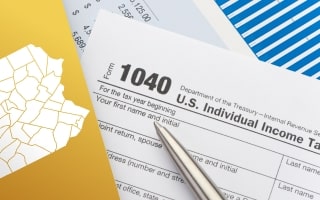Property Tax Records in Pennsylvania

If you live in Pennsylvania, you pay one of the highest tax rates in the country. The average property rate in PA is 1.36%. However, some counties have effective tax rates above 2%. Homeowners pay an average of $3,187 per year in annual taxes, which can significantly impact affordability for many residents.
While property taxes in Pennsylvania are high, tax rates differ for many reasons, which include property location, size, amenities, and condition of the property. Each of Pennsylvania's 67 counties, along with local school districts and municipalities, set their own tax rates for homes in the area.
You should receive your annual property tax bill by March 1. These taxes will be due by March 31. If you don't pay them on time, they may eventually become delinquent. Your property taxes can only be calculated once the assessor in your county identifies your home's fair market value. If your home has a high value, you'll pay more taxes.
In Pennsylvania, the property tax has been collected by state and county governments since 1683. For centuries, tax laws in Pennsylvania didn't undergo much change. Most of the revenue collected by the state came from property taxes. In 1953, a sales tax was introduced to fund education and minimize the state's dependence on property tax revenues. However, property taxes in Pennsylvania are important for the state's budget.
Property Tax Assessment in Pennsylvania

If you own property in Pennsylvania, you must pay taxes annually. Most counties base property taxes on the assessed value, but some use the fair market value (FMV) to set tax rates. It's up to the individual county or municipality assessor to choose their method.
The Pennsylvania State Tax Equalization Board publishes a report each year on the difference between the assessed values and the county's fair market values. These Common Level Ratios may be used in appeals to dispute tax rates.
Most appraisers and tax assessors use the following methods for valuation of property:
Sales Comparison Approach: The sales comparison approach determines the value of a parcel of land by comparing it with recent sales of similar properties (comparables) in the local area. The appraiser compares properties and makes adjustments to the value based on dissimilarities. This method compares size, location, amenities, number of bathrooms and bedrooms, and other features.
Cost Approach: The cost approach determines the value of a property by adding up the cost to replace the property, subtracting depreciation (physical, functional, or economic), and then adding in a value for the land. This method is sometimes referred to as RCNLD+L (Reproduction or Replacement Cost New Less Depreciation plus Land). The cost approach may be used for new construction or special purposes such as churches and museums.
Income Approach: The income approach determines the value of a property by examining its potential for generating income. This method bases the value on how much revenue the property can produce. Value is equal to how much rental income the property can support rather than the value of the existing building and land.
Keep in mind that not every county determines a home's assessed value in the same way. In some places, the assessed value is a percentage of the current market value. Let's say that the county you live in has a 50% assessment ratio. If your home is valued at $250,000, the assessment value would be just $125,000. Some counties require the assessed value to be equal to the market value.
As stated above, each county tax assessor values the property in their jurisdiction and then sets the tax rate. These rates are called "mills", with one mill equal to $1 of property tax for every $1,000 of assessed value.
When calculating your property taxes, let's say that your home is assessed at $125,000. If your county has a mill rate of 25, your property taxes will amount to $3,125. Since mill rates differ from county to county, a more effective solution involves using the effective tax rate. If your county has an effective tax rate of 1%, you'll apply this to your home's fair market value of $250,000. In this situation, you'll pay $2,500 in annual taxes. The tax rates in the most populous Pennsylvania counties are:
- Philadelphia County: 1.05%
- Allegheny County: 2%
- Montgomery County: 1.62%
- Bucks County: 1.55%
- Delaware County: 2.30%
Calculate Pennsylvania Taxes
Using a Pennsylvania property tax calculator is a smart way to gain a clearer understanding of how property taxes are calculated across the state. This tool allows both homeowners and real estate investors to input key property details, such as location, market value, and property classification, to estimate their annual tax assessment and liability. In Pennsylvania, property taxes are determined by local school districts, counties, and municipalities, and the tax rates vary depending on the location.
A Pennsylvania property tax calculator can also help identify potential exemptions and tax relief programs that may reduce your tax burden. These include the Homestead Exemption, which offers a reduction in the taxable value of a primary residence, and the Property Tax/Rent Rebate Program, which provides income-based relief for seniors, widows, widowers, and individuals with disabilities. The calculator can help homeowners identify which programs they may qualify for, ensuring they make the most of available savings opportunities.
using our property tax calculator.
Pennsylvania Property Tax Records: What Are They?

Property taxes are an essential aspect of local government because they pay for things like schools, emergency services, bridges, parks, road repair and maintenance, police, and government office officials. Counties determine how much taxes they require based on their annual budgets.
Property tax records in Pennsylvania include tax bills and assessments. They may also include overdue notices, tax liens, and foreclosures. These records relate to the property and the current owner, who is affected by them. You can find property tax records on the county government's website. Some of the details you might find in these documents include the following:
-
Map ID
-
Parcel ID
-
Land use code
-
Lot size
-
School district
-
Owner names
-
Current assessment value
-
Estimated taxes
-
Info on previous sales
-
Accessory structures
-
Assessment breakdown and history
-
Map
-
Permits
-
Photos
-
Building style
-
Year built
-
Square footage
-
Sketch
The town, county, or municipality needs to keep track of all the property in its jurisdiction. Every homeowner is responsible for contributing to the area's upkeep and helping to pay for the expenses. Property records help government officials to do that. They also provide third parties with information about the value of property in the area and the tax base.
Property Tax Exemptions and Deductions in Pennsylvania

Like most states, Pennsylvania offers certain residents exemptions and deductions to help lower their tax rates. Depending on the exemption you qualify for, it can either reduce your home's assessed value or cover some of the taxes you owe. Here are some of the most relevant exemptions you can apply for.
Homestead Exemption: The homestead deduction is available to anyone who resides full-time in their home. Once you register your property, the assessed value may be lowered, and you'll pay lower taxes. If you qualify for this exemption, your home's assessed value should be lowered by $18,000.
Senior and Disabled Exemptions: The state also accommodates seniors and disabled Americans with additional discounts called "rebates." The rebate can range from $380-$1,000.
Keep in mind that some counties offer additional senior exemptions. For example, Allegheny County provides a senior exemption to homeowners who have lived in the same property for at least 10 years. You can qualify if you're at least 60 years old and earn an annual income of less than $30,000. This exemption reduces your annual tax bill by 30%.
Other Property Tax Deductions: Pennsylvania also offers deductions to military personnel and their spouses. For more real estate tax exemption information, visit the Department of Military and Veterans Affairs.
How To Search Property Tax Records in Pennsylvania

One of Pennsylvania's primary sources of property tax records is your local tax assessor's office. To find a list of each office, visit the Pennsylvania Department of Community and Economic Development. Also, try visiting each county's website. Many of them have search portals.
You can also search for Pennsylvania property tax records using online property databases and realty websites. Many property records, including taxes and assessments, are public records. Additionally, accessing these records can help you make informed decisions when buying or selling property in the state.
You can also use a commercial tool like PropertyChecker to find millions of property records 24/7. You have access to unlimited searches and can find Pennsylvania property records within minutes. T The types of information you can search for include the following:
-
Property details, such as the number of bedrooms and bathrooms
-
Current market and assessed values
-
Deed records
-
Lien records
-
Loan information
-
Property tax records
-
Foreclosure details
-
Building permit information
-
Owner names
-
Sales history
-
Neighborhood data, which includes crime statistics
How To Appeal Property Taxes in Pennsylvania

Although the state does its best to value each piece of property correctly, it won't get every single one correct. Therefore, residents may take issue with the valuation of their property and the resulting tax rate. You have the right to appeal if you feel strongly that the assessor made an error when evaluating your property. It's important to gather supporting evidence, such as comparable sales and photographs, to strengthen your case during the appeal process.
As mentioned before, Pennsylvania has Common Level Ratios (CLR) that display the ratio of assessed values in a specific county to the market value. Let's say that the CLR in your county is four. If your home is worth $200,000, its assessed value will be $50,000. This doesn't overrule the assessed value in your county. However, it can be used as the basis for your appeal.
Step 1: You can contact the Pennsylvania Board of Appeals by calling (717) 783-3664. You can also download appeal forms here. You must supply documentation to support your argument (outside opinion, market valuation, appraisal, etc.). The appeals board will hear your case and make their final ruling.
Step 2: If you don't agree with this ruling, you can file an appeal to the Board of Finance and Revenue. Pay attention to any deadlines or hearing dates that you receive from the Board of Finance and Revenue after you file the appeal. Failing to meet these deadlines could jeopardize your case, so it's crucial to stay organized and proactive throughout the process.
How Property Tax Records Impact Real Estate Transactions in Pennsylvania

Property taxes factor in quite a bit when deciding which home to buy. If you like two properties in neighboring towns, the one with the lower taxes may be more affordable. You must think long-term about how the tax rate will increase over time.
Before buying any property in Pennsylvania state, you should consult property records to find out as much as possible about it. Check for any liens, unpaid taxes, foreclosures, or other issues that could complicate the transaction. Don't wait for the closing company to perform their property title search; you can learn a lot on your own.
If you find a property you want that has tax liens in Pennsylvania on it, you or the current owner will have to pay those off before you can take the title. No property can be sold with tax liens open. They must be resolved before the real estate deal can proceed.
When selling a home, consider how the property taxes you've been paying will impact potential buyers. If buyers are unwilling to make competitive offers, you could pay for some of their closing costs or the first year of property taxes.
As for investors, they use property tax records to accurately estimate how much they'll pay every year. If the taxes on a property are too high, it may be impossible to earn money on the investment.
Investors often use tax liens to acquire real estate in Pennsylvania. If investors buy a piece of property with a tax lien on it, they may pay off the lien and pick up a relatively expensive property for far less than market value. It can be a great way to make a quick return on real estate.
When a homeowner doesn't pay their taxes on time, they will become delinquent on January 1 of the following year. The county will then place a tax lien on the property and sell it to an investor at a public auction. The property itself can be foreclosed on if the current owner doesn't repay their delinquent taxes in two years.
To find tax-delinquent properties in Pennsylvania, you can perform a Google search for tax lien auctions or distressed properties in Pennsylvania. Realtors, county websites, and other repositories will list Pennsylvania tax lien auctions in your area. For example, Erie County or Montgomery County. While competition can be high, there are still plenty of chances to find a great deal on tax-delinquent properties in Pennsylvania, if you're willing to do the legwork.
Free Pennsylvania Property Tax Lookup
Tax Records Please wait...
Property Tax Guide
- Property Tax Records in Pennsylvania
- Property Tax Assessment in Pennsylvania
- Pennsylvania Property Tax Records: What Are They?
- Property Tax Exemptions and Deductions in Pennsylvania
- How To Search Property Tax Records in Pennsylvania
- How To Appeal Property Taxes in Pennsylvania
- How Property Tax Records Impact Real Estate Transactions in Pennsylvania
Instant Access to Pennsylvania Property Records
- Owner(s)
- Deed Records
- Loans & Liens
- Values
- Taxes
- Building Permits
- Purchase History
- Property Details
- And More!
Free Pennsylvania Property Tax Lookup
Tax Records Please wait...
Property Tax Guide
- Property Tax Records in Pennsylvania
- Property Tax Assessment in Pennsylvania
- Pennsylvania Property Tax Records: What Are They?
- Property Tax Exemptions and Deductions in Pennsylvania
- How To Search Property Tax Records in Pennsylvania
- How To Appeal Property Taxes in Pennsylvania
- How Property Tax Records Impact Real Estate Transactions in Pennsylvania